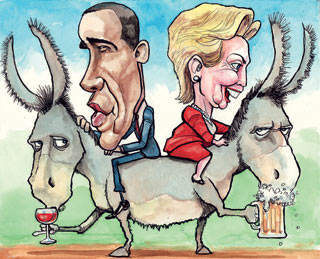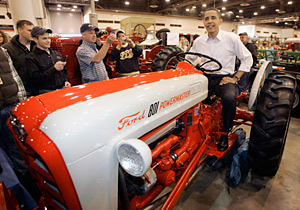What I find interesting about this debacle is how political discourse gets reduced to simple dichotomies, highlighting one or another discursive difference. In this case it's smart vs. dumb, un(der)educated vs. intellectual, country vs. city, and somewhere deep down class and race lurk as subtexts. Take
the spin Salon.com put on this case:
Rubes. Rednecks. Low-information voters. Beer-track voters. NASCAR man. Bubba. Retro America. These terms have all been used by well-known progressive writers and thinkers to describe white working-class Americans. This familiar litany of contempt provides the context for the firestorm that erupted Friday, when Sen. Barack Obama's remarks to a closed-door group of rich donors in San Francisco were made public by a blogger for the Huffington Post.
The list of derogatory terms Salon's writer Michael Lind opens his article with is tantalizing... Let's look at them using sophisticated analytical apparatus such as etymology, cultural text studies and semiotics (sorry beer-trackers!):
Merriam-Webster tells us that a 'Rube' is 'an awkward, unsophisticated person' and that the etymology is that it it a short, nick-name form of the Christian name 'Reuben'. For more colour, let's go to the
OED, where we find late nineteenth century phrases like these: "We could make sandwich money in front of a hootchy-kooch palace, barking at the Rubes" or "They know a Rube when they see him, or a guy, or a crook, or a bonehead." The first users of the term seem to have been carnies, or barkers trying to find easy marks at carnivals and freak-shows. Hmmm... nice tie-in with the political side-show usage in Salon.com! What must also be noted here is the class and ethnic slant built in to the Rube term: country bumpkins and yokels of German, Dutch or Jewish stock (possible shades of anti-semitism here?)... The most famous Rube in popular culture, btw, is
Rube Goldberg, whose cartoon inventions of comically complicated machines to perform simple tasks such as teeing up a golf ball make him a perfect schmuck...

'Rednecks' is an old favourite term for Southern, working-class whites - anecdotally related to the red dirt of the region ending up on said farmers' necks. Again from the OED, and that wonderfully colourful, non-pc decade, the 1890s: "a name applied by the better class of people to the poorer inhabitants of the rural districts." Synonyms would include "crackers, tar-heels and other poor white trash." Ouch...
With 'low-information' we are in another realm, that of euphemism and understatement. A franker, non-pc and politically suicidal way of putting it would be 'ignorant'. Ignorance of course doesn't come without a lot of hard work: the work of not going to school, not reading books, not challenging one's mind, not caring to gain 'information'...
With 'Beer-track' things are getting interesting:
The Economist already had the low-down on this term and its opposite, 'wine-track', in an article in early March:
A famous political distinction exists between “wine-track” and “beer-track” Democrats. Wine-track Democrats have traditionally supported reform-minded liberals such as Gary Hart and Paul Tsongas. Beer-track Democrats have preferred more practical-minded pols. Walter Mondale famously hammered the nail into Gary Hart's coffin when he stole a line from a hamburger advertisement and asked “Where's the beef?” [...] Obamaworld is a universe of liberal professionals and young people—plus blacks from all economic segments. Hillaryland, by contrast, is a place of working-class voters, particularly working-class women, and the old. These are people who occupy not just different economies but also different cultures. How many white Obama voters eat in Cracker Barrel or Bob Evans? And how many Clinton voters have a taste for sushi?
The illustration by Kevin Kallaugher is pretty neat too:

But what is the deal with the beer-track/wine-track dichotomy? It's an obviously displaced class-metaphor similar to other beverage-related nicknamings of a swank neighbourhood, such as the 'whiskey-belt', but a particularly insidious one because it has its open antithesis built into it: beer and wine (unlike whiskey and soda) don't mix - it's one or the other. The cultural connotations appear to ameliorate the harshness of the dichotomy but in reality only exacerbate it. Beer spells underclass, loss of control, drunkenness and loutish behaviour -
Animal House. Wine spells sophistication, finesse and distinction -
Sideways. The metaphor is related to the mind, and functions as a conduit over into the same 'intellectual - dumb' split as 'Rube' and 'redneck' signify. Virginie Boone spins the lighter side of the dichotomy in
this blog...
'NASCAR', of course, refers to the funny kind of American stock car racing where the races are carried out on oval tracks, so that the intelligence of the drivers is not overtaxed by them having to keep a distinction between left and right always ready in their busy little brains - but that of course is just my snotty intellectual preference for types of racing where actual skills behind the wheel has an impact on the result. By inference the audience - 'fans' - of the sport (NASCAR-man and Mrs. NASCAR-man) are also associated with drink, rowdiness, a penchant for crashes and violent death, and low intelligence (actually I would have expected a Republican slant in NASCAR's fan base...) Peter Bainart writes almost with as much bias as I could muster in the above where I was trying to be sarcastic and exaggerate as much as possible:
Let's call him Nascar Man ... Nascar Man is the guy liberals need to win, but usually don't. He loves guns, pickup trucks, chewing tobacco, and church on Sunday. He thinks liberals are high-taxing, culturally libertine, quasi-pacifist wimps. And, once liberals have conjured him up, they no longer say what they really believe -- even to one another ... Nascar Man inhibits intellectual inquiry. He's the bully everyone wants to appease.
There is a funny soul-searching
blog on this quote from a guy called Mark Schmitt that I can recommend...
'Bubba' is NASCAR-man's younger brother, second cousin, dad, grandad, next-door neighbour etc. Nuff said... In fact the only Bubba I really need to refer you to is golfer
Bubba Watson, the longest hitting man on the PGA tour (No. 1 in driving distance w. 310 yards, but unfortunately only no. 178 in driving accuracy...) Bubba hails from Bagdad - that is Bagdad, Florida, not the Middle Eastern hot-spot we Europeans tend to think of first when hearing that name... He is comfortable with his masculinity, to the degree of using a pink shaft in his big stick (golf slang for the driver...) Bubba is best friends and hunting buddy with another Florida golfer 'Boo' Weekley, another hick from the sticks who recently tried to bring rifle cartridges on a commercial airplane...
Finally, we have the funny appellation 'Retro America', which must refer to the nostalgia among some democrats for the days of vintage consumer USA, as indicated in
the blog that wears this label on its sleeve: "travel back to a time of pink kitchens, cars with huge fins, barbeques by the backyard pool". Pre-Kennedy USA, pre-desegregation USA, pre-Women's Lib, pre-Vietnam, pre-Moon landings, pre-oil crisis USA... The days when a man was a man and a woman was a housewife. The days of rock'n'roll, before Betty Friedan, Black Power, hippies and yippies, the youth revolt and the liberal university. Aren't we all just drooling by now...?
These days 'retro' is almost synonymous with 'vintage' - certainly in the fashion business. Again with an analogy across discourse spheres we understand the deep rooted wish for a simpler retro-fitted world in the political sphere as well. A nostalgia for simplicity that is deeply disturbed by the fact that the Democrats contesting this nomination are dreadfully unsimple by dint of their unprecedented distribution in terms of ethnicity and gender: Will NASCAR-man, Bubba and the wifey, prefer a woman or a black man? Whoa, honey - let's turn back the clock on that one...
The list of stereotypes is done, but what remains is that discourse such as Salon's simplifies matters greatly. All Americans can comfortably choose between beer and wine, meat & potatoes and pasta, Daytona and The Metropolitan Museum, swamp blues and string quartets. As Pierre Bourdieu teaches us it is all a matter of
distinction... But the real political choice is too important to be reduced to a matter of taste - it's complicated, not least by the differences of gender and race which are carefully avoided by the candidates themselves most of the time, and the political pundits virtually all of the time. They prefer a nice food metaphor or a stock cartoon character any day. The reason this debate came back to smack Obama is that a mostly dormant major difference all of a sudden got vitalised by his remarks: class reared its ugly little head. Good thing pundits could 'culturate' it back in its basket by turning the debate into something else: dumb/smart stereotypes.
 Barack Obama may have committed a major political faux pas last week when he spoke out on the attitudes of some prospective working class voters: "It's not surprising then," he said, "that they get bitter, they cling to guns or religion or antipathy to people who aren't like them or anti-immigrant sentiment or anti-trade sentiment as a way to explain their frustrations." Hillary Clinton quickly saw an opening and worked the spin to the max: “It’s being reported that my opponent said that the people of Pennsylvania who faced hard times are bitter; well, that’s not my experience,” Mrs. Clinton told an audience at Drexel University. “Pennsylvanians don’t need a president who looks down on them; they need a president who stands up for them, who fights for them, who works hard for your futures, your jobs, your families.” Certainly Obama committed a bad move in terms of navigating discourse spheres: by raising the otherwise silent class issue, he opened himself up to all kinds of metaphorical abuse.
Barack Obama may have committed a major political faux pas last week when he spoke out on the attitudes of some prospective working class voters: "It's not surprising then," he said, "that they get bitter, they cling to guns or religion or antipathy to people who aren't like them or anti-immigrant sentiment or anti-trade sentiment as a way to explain their frustrations." Hillary Clinton quickly saw an opening and worked the spin to the max: “It’s being reported that my opponent said that the people of Pennsylvania who faced hard times are bitter; well, that’s not my experience,” Mrs. Clinton told an audience at Drexel University. “Pennsylvanians don’t need a president who looks down on them; they need a president who stands up for them, who fights for them, who works hard for your futures, your jobs, your families.” Certainly Obama committed a bad move in terms of navigating discourse spheres: by raising the otherwise silent class issue, he opened himself up to all kinds of metaphorical abuse.




